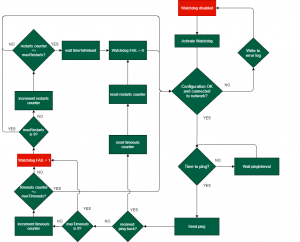Difference between revisions of "Watchdog"
| Line 44: | Line 44: | ||
The Watchdog monitors specified IP address. The ping is sent every 60s and waits 5s for the device to respond. If the ping fails twice in a row, Watchdog returns <code>FALSE</code> and restarts the device (Rule for the restart action must be defined separately, see Rules). After the device restarts, it waits 120 seconds and starts monitoring again. This cycle repeats for a total of 3 times. If the device does not respond even once, the Watchdog remains in error. | The Watchdog monitors specified IP address. The ping is sent every 60s and waits 5s for the device to respond. If the ping fails twice in a row, Watchdog returns <code>FALSE</code> and restarts the device (Rule for the restart action must be defined separately, see Rules). After the device restarts, it waits 120 seconds and starts monitoring again. This cycle repeats for a total of 3 times. If the device does not respond even once, the Watchdog remains in error. | ||
| − | < | + | <nowiki> |
{ | { | ||
"target": "192.168.101.180", | "target": "192.168.101.180", | ||
| Line 52: | Line 52: | ||
"timeToReboot": 120, | "timeToReboot": 120, | ||
"maxRestarts": 3 | "maxRestarts": 3 | ||
| − | }</ | + | }</nowiki> |
| − | |||
| − | |||
| − | Watchdog monitors | + | ---- |
| + | |||
| + | The Watchdog monitors specified domain. The ping is sent every 10s and waits 5s for a response. If the ping fails, Watchdog waits 180 seconds and tries again for a total of 5 times, then returns <code>FALSE</code>. Subsequently, an action is called to restart the device (Rule for the restart action must be defined separately, see Rules). | ||
After restart, the Watchdog returns from the error state and runs the cycle again, a total of 3 times. Then the Watchdog remains in an error state until the first successful ping. | After restart, the Watchdog returns from the error state and runs the cycle again, a total of 3 times. Then the Watchdog remains in an error state until the first successful ping. | ||
| Line 62: | Line 62: | ||
''Note: In case of unsuccessful domain translation (eg communication with the DNS server fails), error will be written to the device log. Failed DNS resolution therefore prevents pinging of URLs, but has no effect on pinging IP addresses. Eg. pinging local network IP addresses will continue to work.'' | ''Note: In case of unsuccessful domain translation (eg communication with the DNS server fails), error will be written to the device log. Failed DNS resolution therefore prevents pinging of URLs, but has no effect on pinging IP addresses. Eg. pinging local network IP addresses will continue to work.'' | ||
| − | < | + | <nowiki> |
{ | { | ||
"target": "google.com", | "target": "google.com", | ||
| Line 70: | Line 70: | ||
"timeToReboot": 180, | "timeToReboot": 180, | ||
"maxRestarts": 3 | "maxRestarts": 3 | ||
| − | }</ | + | }</nowiki> |
Revision as of 09:22, 20 October 2021
Watchdog is a tool that allows you to ping a given (IP) address using the ping command. In this way, you can eg. monitor the availability of a device connected to the output or connectivity to the Internet.
In case of failure, it is possible to invoke a follow-up rule-based action (see Rules). Output of Watchdog is the variable FAIL. It shows value TRUE when evaluation ends with a failure or FALSE when pinging is successful.
Structure
| Variable | Value | Description |
|---|---|---|
| target | IP / URL | Monitored address |
| pingInterval | int | [s] Time interval between pings |
| timeout | int | [s] Time waiting for answer |
| maxTimeouts | int | Number of failed pings required to evaluate to FAIL=TRUE
|
| timeToReboot | int | [s] Time the Watchdog waits after announcing an error condition before starting a new cycle |
| maxRestarts | int | Maximum number of restarts when an error condition is declared. After this limit is reached, the Watchdog remains in an FAIL=TRUE state until the next successful ping.
If set to 0, the Watchdog will restart the device after each |
Examples
The Watchdog monitors specified IP address. The ping is sent every 60s and waits 5s for the device to respond. If the ping fails twice in a row, Watchdog returns FALSE and restarts the device (Rule for the restart action must be defined separately, see Rules). After the device restarts, it waits 120 seconds and starts monitoring again. This cycle repeats for a total of 3 times. If the device does not respond even once, the Watchdog remains in error.
{
"target": "192.168.101.180",
"pingInterval": 60,
"timeout": 5,
"maxTimeouts": 2,
"timeToReboot": 120,
"maxRestarts": 3
}
The Watchdog monitors specified domain. The ping is sent every 10s and waits 5s for a response. If the ping fails, Watchdog waits 180 seconds and tries again for a total of 5 times, then returns FALSE. Subsequently, an action is called to restart the device (Rule for the restart action must be defined separately, see Rules).
After restart, the Watchdog returns from the error state and runs the cycle again, a total of 3 times. Then the Watchdog remains in an error state until the first successful ping.
Note: In case of unsuccessful domain translation (eg communication with the DNS server fails), error will be written to the device log. Failed DNS resolution therefore prevents pinging of URLs, but has no effect on pinging IP addresses. Eg. pinging local network IP addresses will continue to work.
{
"target": "google.com",
"pingInterval": 10,
"timeout": 5,
"maxTimeouts": 5,
"timeToReboot": 180,
"maxRestarts": 3
}
